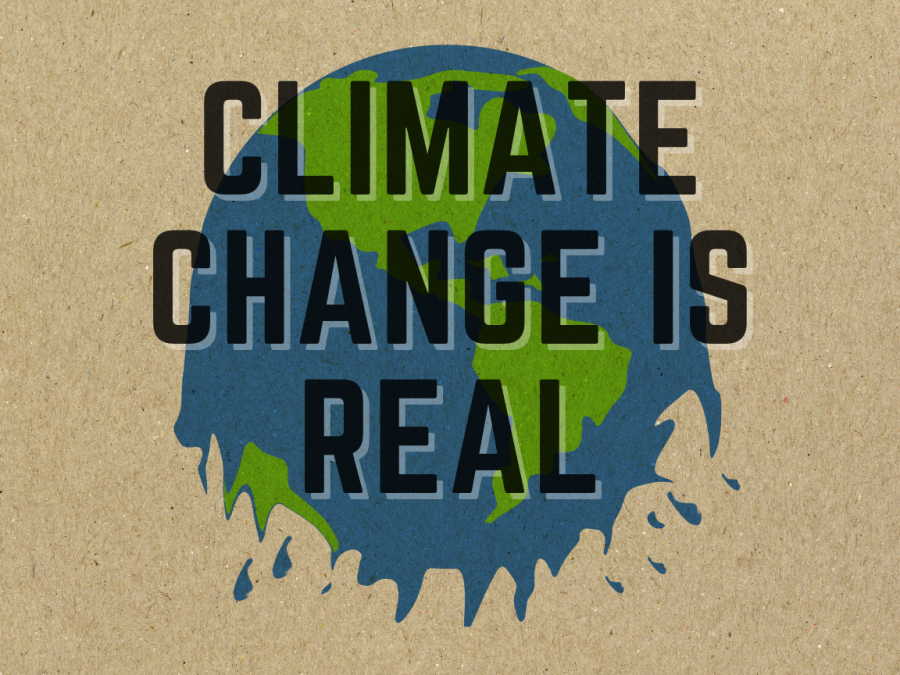Climate change is Earth’s biggest threat
Canva image made by Lydia Tesfaye
Climate change is steadily becoming the biggest problem we are facing in the world and is impacting Sacramento in many ways as well. The city of Sacramento made a bill, AB 617, that plans on reducing the air pollution in the city.
Air pollution is one of the major issues affecting the environment’s health, human health and climate change.
Climate change is a major ecological and humanitarian crisis that is affecting the health and sustainability of the Earth and of its inhabitants.
There are several different types of air pollution. There is ammonia, carbon monoxide, sulfur dioxide, nitrous oxides, methane, carbon dioxide, chlorofluorocarbons, particulates and biological molecules.
Some of the major causes to these air pollutants are unsustainable animal agriculture, coral reef destruction and bleaching (coral reef provides half of earth’s oxygen and absorbs ⅓ of CO2 emitted from fossil fuels), industrial processes, the transportation sector, mining and smelting, coal power plants, waste incineration, landfills and slash-and-burn forestry practices.
Every year, an estimated 7-8 million people die prematurely due to poor air quality around the world.
Because of this, the city of Sacramento released a bill in order to combat the effects of air pollution and punish those who pollute too much. The bill is meant to reduce public exposure to air pollutants and preserve public health.
The bill, AB 617, has five central components. Community-level air monitoring, a state strategy and community specific emission reduction plan, accelerated review of retrofit pollution control technologies on industrial facilities subject to Cap-and-Trade and enhanced emission reporting requirements, increased penalty provisions for polluters and reimbursement requirements from the state to local agencies and school districts for certain cost mandates, according to the Sacramento Metropolitan Air Quality Management District information website.
The bill itself is an important piece of legislation and the precedent it set for further programs and progress to be made is valuable, however, cities and counties have been enacting programs and policies for decades and there has been no visible change to the overall outlook of climate change and global warming.
Two years following the AB 617 Bill, the United Nations released a report concerning climate change and referred to the outlook for climate change as “bleak.”
Creating multiple small goals to achieve over a period time is important, however, the world has come to a tipping point.
We have ignored and discredited the threat of climate change for decades, and have even created misconceptions about it. In a 1980 speech, Ronald Reagan accredited trees and vegetation to nitrogen dioxide air pollution, according to a Washington Post news archive.
Misconceptions concerning climate change have riddled policy-making for decades.
There needs to be incredibly proactive and meaningful change. For example, zero net carbon across the board on a community, city, county, state, federal and international level. There needs to be cooperation and collaboration between all these levels of government in order for the world to even have a chance at survival.
2020 was meant to be a critical year for action to combat climate change, according to the United Nations Environmental Programme. However, we were faced with a pandemic that has devastated the world and completely diverted global attention from the looming threat of climate change.
Even at the 2021 Conference of Parties, COP26, President Joe Biden promised to cut 30% of methane emissions within the next decade, this seems like a step forward but this goal falls short at acknowledging that the amount of methane emissions increase exponentially every decade.
Global methane emissions have increased annually by almost 10% within the past two decades, according to a news article from Nature.
Climate change, global warming and air pollution are issues that won’t be, and haven’t been, slowly increasing over the years. These are dangerous issues that are growing exponentially and solutions will be completely out of reach soon.
Every year is a critical time for action against climate change because we are out of time to push this issue aside and talk about, or ‘prioritize,’ something else.

